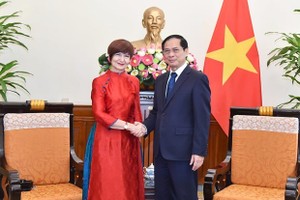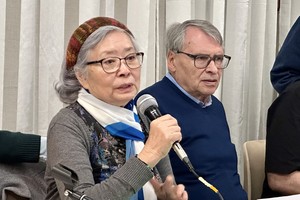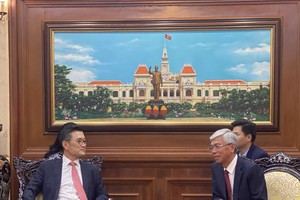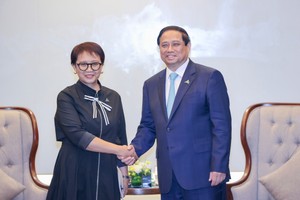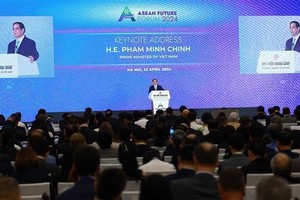SEOGWIPO, South Korea (AFP) – South Korea and Japan pressed China Sunday to censure North Korea over the sinking of a South Korean warship, but failed to win its public support for the move after a three-way summit.
Host President Lee Myung-Bak and Japanese Prime Minister Yukio Hatoyama teamed up at the two-day summit to urge Chinese Premier Wen Jiabao to hold Pyongyang responsible for the March sinking of the South Korean corvette.

But Wen gave no sign China is ready to back United Nations Security Council action against its ally over the sinking.
"The urgent task now is to defuse the impact of the Cheonan incident, change the tense situation and avoid clashes," Wen told a joint press conference.
"China will actively communicate with relevant parties and lead the situation to help promote peace and stability in the region, which fits our common and long-term interests best."
South Korea announced reprisals against the North after international investigators reported on May 20 that a North Korean submarine fired a heavy torpedo to sink the Cheonan.
The North denies involvement and has responded to the reprisals with threats of war, fuelling regional tensions.
Wen, whose country is the North's economic lifeline, has been cautious since arriving in South Korea Friday.
At a meeting with Lee that day, he said Beijing would review the probe results before determining its position but would not protect whoever was responsible.
Lee told the press conference in the southern resort island of Jeju that he expects "wise cooperation" by neighbouring countries in handling the disaster.
Hatoyama, whose country Friday announced new sanctions on the North over the incident, said the three leaders agreed "that this is a serious issue related to peace and stability in Northeast Asia".
South Korea, at least in public, appeared fairly satisfied with the outcome.
"The inclusion of those remarks on the Cheonan in the joint press announcement in itself has significance," said senior presidential spokesman Lee Dong-Kwan.
But Paik Haksoon, of the Sejong Institute think-tank, said Wen's comments "indicate that China is still questioning the authenticity and authority of the investigation".
"There would be no point of taking this issue to the UN Security Council without securing support from China in advance," Paik told AFP.
The North says the South's government faked evidence to incite tensions and boost its support before local elections this week.
South Korea, the United States and Japan need the support of veto-wielding member China to sanction -- or, at least, to censure -- the North at the Security Council.
The South's reprisals include a trade cut-off and preparations to resume cross-border loudspeaker propaganda broadcasts. The North has threatened to shell the loudspeakers now being installed along the tense frontier if the broadcasts go ahead.
The North has cut all ties with the South, scrapped pacts aimed at averting accidental flare-ups along their disputed sea border and vowed to attack any intruding ships.
It has threatened to shut down a jointly run industrial park at Kaesong, the last reconciliation project still operating.
The South plans to send a letter to the Security Council chairman this week, an unidentified official told Yonhap news agency. "If it's too late, we might lose momentum," said the official.
Hatoyama promised Japan's "leading role" in mustering international support for the South at the council, according to Lee's spokesman.
At Hatoyama's suggestion the three leaders observed a moment of silence when the summit began Saturday to mourn the sailors.
In its latest response, North Korea again flatly rejected evidence that it torpedoed the ship. It said it did not possess the type of small submarine allegedly used for the attack, according to Pyongyang's official news media.
Other issues raised at the summit included a possible three-way free-trade agreement and November's G20 summit in Seoul. The leaders called for free-trade talks aimed at eventually creating a single economic bloc to be speeded up.

